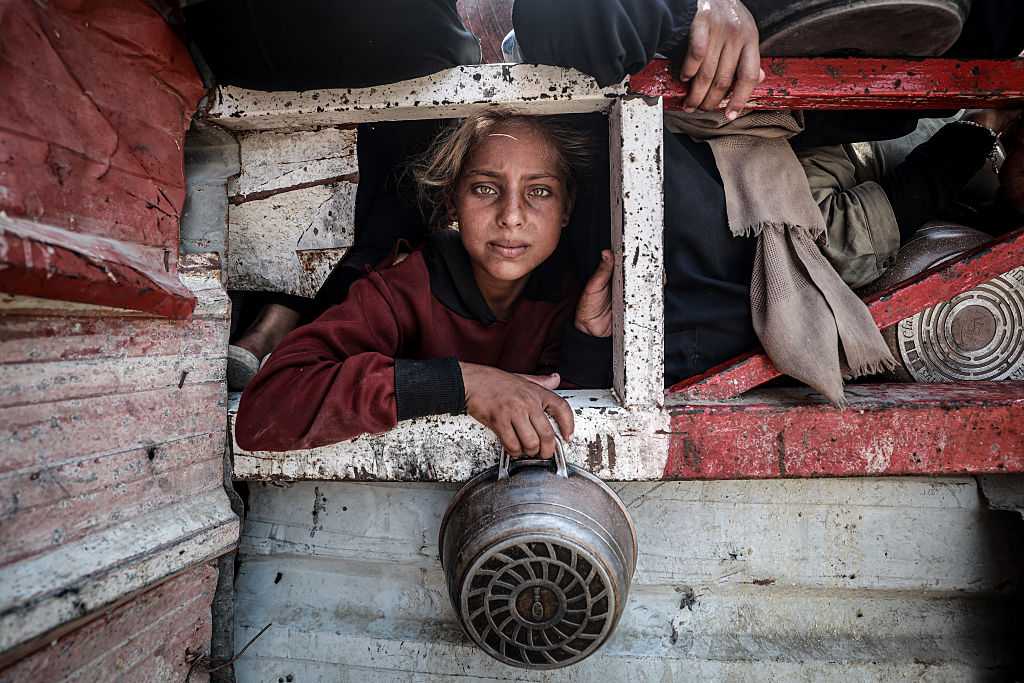The Israeli defense forces initiated a temporary halt in combat within three densely populated regions of Gaza for 10 hours daily, as part of a sequence of measures taken amid growing worries about increasing food shortages and under mounting global scrutiny of Israel’s actions during the 21-month conflict.
The armed forces announced it would implement a “tactical break” in Gaza City, Deir al-Balah, and Muwasi, three regions with significant populations, to “enhance the volume of humanitarian assistance” being brought into the area. The pause will occur daily from 10:00 a.m. to 8:00 p.m. local time, effective starting Sunday.
The armed forces also stated that they would establish safe pathways for delivering assistance and that they conducted aerial drops of supplies into Gaza, which contained packages of flour, sugar, and canned food.
Food specialists have been cautioning for months about the potential for a famine in Gaza, where Israel has limited aid shipments, asserting that Hamas diverts supplies to support its governance, though it has not presented proof for this assertion. Recent images from Gaza showing severely undernourished children have intensified international condemnation of Israel, including from its close allies, who are demanding an end to the conflict and the humanitarian crisis it has caused.
The United Nations’ food organization praised the efforts to reduce aid limitations, but emphasized that a more comprehensive ceasefire is necessary to guarantee that supplies reach all those in need in Gaza.
Israel stated that the new measures are being implemented as it continues its military operations against Hamas in other regions. Before the pause, health officials in Gaza reported that at least 27 Palestinians were killed in separate airstrikes.
This (humanitarian) ceasefire will be meaningless if it doesn’t become a genuine chance to save lives,” stated Dr. Muneer al-Boursh, head of Gaza’s Health Ministry, who urged an influx of medical supplies and other essentials to address child malnutrition. “Every delay is counted in another funeral.
A temporary halt in hostilities in the region occurred several days after efforts to establish a ceasefire between Israel and Hamas seemed uncertain. On Friday, Israel and the United States withdrew their negotiation teams, citing blame on Hamas, while Israel indicated it was exploring “other possibilities” instead of continuing ceasefire discussions with the group.
Israel states it is ready to conclude the conflict if Hamas surrenders, lays down arms, and relocates, a proposal that the group has declined to accept.
A senior Hamas official, Mahmoud Merdawi, stated that Israel’s shift in approach regarding the humanitarian situation indicated an admission that there are starving people in Gaza. He claimed the action was aimed at enhancing Israel’s global image rather than genuinely saving lives.
He stated that Israel “will not avoid consequences and will certainly face the cost of these unlawful actions.”
Following the conclusion of the most recent ceasefire in March, Israel completely halted the entry of food, medicine, fuel, and other essential supplies into Gaza for 2½ months, claiming the action was intended to compel Hamas to free hostages.
Faced with global pressure, Israel made minor adjustments to the blockade in May. Since then, approximately 4,500 trucks have been permitted by the U.N. and other humanitarian organizations to deliver supplies. However, the daily average of 69 trucks is significantly less than the 500 to 600 trucks per day that the U.N. claims are necessary for Gaza. The U.N. reports that it has struggled to deliver much of the aid, as hungry crowds and criminal groups often seize most of what arrives on its trucks.
As a method to redirect assistance from the U.N.’s oversight, Israel has supported theU.S.-registered Gaza Humanitarian Foundation, which in May established four centers distributing food supply boxes.Over 1,000 Palestinians have lost their livesSince May, Israeli forces have been targeting individuals attempting to obtain food, primarily near the new aid locations, according to the U.N. human rights office.
Israel has criticized the U.N. during the conflict, asserting that its system enabled Hamas to seize humanitarian aid. The U.N. rejects this assertion, stating that its distribution method was the most effective way to deliver assistance to Palestinians.
The armed forces stated that the recent actions were taken in collaboration with the U.N. and various humanitarian organizations.
A significant portion of Gaza’s population, confined to smaller and smaller areas due to ongoing conflict, now depends on assistance.
The United Nations World Food Programme stated in a release that one-third of Gaza’s population, approximately 2 million people, had gone without food for several days, while almost half a million individuals were facing conditions similar to famine. The organization mentioned that it has sufficient food available or en route to the area to provide for the entire population of Gaza for almost three months.
The Awda Hospital in Nuseirat reported that Israeli forces killed at least 11 individuals and injured 101 people as they were traveling to a GHF aid distribution location in central Gaza. GHF, which claims it is not associated with any of the violence around its facilities, has not yet provided a response to a request for comment. The military stated it is investigating the incident.
In another location, a strike damaged a tent that was providing shelter to a displaced family in the Asdaa area, situated northwest of the southern city of Khan Younis. At least nine people were killed, as reported by Nasser Hospital. The victims included a father and his two children, as well as another father and his son, according to the hospital.
In Gaza City, an attack struck an apartment late Saturday on the western part of the city, resulting in four fatalities, including two women, as reported by the Health Ministry’s ambulance and emergency services. On Sunday morning in Deir-al-Balah, an explosion near a tent close to a desalination plant led to the death of a couple and another woman, according to Al-Aqsa Martyrs Hospital.
The Israeli armed forces did not provide an immediate response to the attacks.
The armed forces reported on Sunday that two additional soldiers lost their lives in Gaza, increasing the overall count of military personnel killed since October 7, 2023, to 898.
The conflict started with Hamas’ attack in October 2023 on southern Israel, during which fighters killed 1,200 individuals, primarily non-combatants, and captured 251 captives. Hamas continues to hold 50 of these individuals, with over half thought to have perished.
Israel’s counterattack has resulted in the deaths of over 59,700 Palestinians, as reported by Gaza’s Health Ministry. This figure does not separate between combatants and non-combatants, although the ministry states that over half of those killed are women and children. The ministry functions under the Hamas administration. The U.N. and other global organizations regard it as the most trustworthy source for casualty information.
Goldenberg covered events from Tel Aviv, Israel, while Magdy reported from Cairo.







